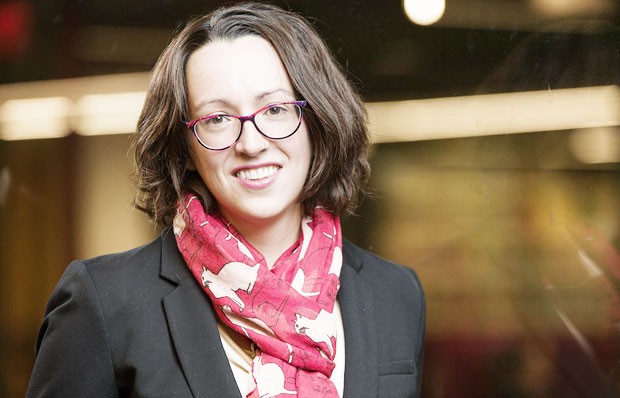Towards a more accessible library

Making academic libraries more accessible requires exploring diverse experiences of disability and sharing knowledge across the university, says Claire Burrows, who joined Concordia Library as a researcher-in-residence this month.
Now in its second year, the library’s researcher-in-residence program supports its efforts to foster a strong research culture and to promote evidence-based librarianship.
The program offers the opportunity for scholars, information professionals, or doctoral students to focus on an area of inquiry in a supportive and enriching environment, and to interact with Concordia Library staff and its resources.
A PhD candidate in Library and Information Science at Western University, Burrows researches the accessibility of academic libraries in Canada for students with disabilities. Viewed through the lens of critical disability theory, her research aims to help practitioners improve library accessibility and support for students with disabilities.
What inspired your study of critical disability theory?
Claire Burrows: I previously worked as a practical support worker at the University of Nottingham for student and disability support services. Mostly this involved notetaking for students with disabilities, but part of the process involved disability awareness training, where I was introduced to various definitions and interpretations of disability.
I had not really thought about these things previously, but it really resonated with me. I began to do more reading around disability theory, and how this theory was used in libraries, and found it hadn’t really appeared much yet.
What are a few misconceptions about your research?
CB: I’m not sure if these are misconceptions exactly, but I get asked a lot about what kinds of disability I’m interested in. I think people often think it’s about individuals who use wheelchairs, and increasingly about those who have learning disabilities.
People don’t often think about chronic illnesses, mental health, even concussions, and how the experiences of disability may fluctuate from one day to the next. These ideas of what disability actually means is part of what I’m really interested in.
Is intersectionality increasingly a consideration?
Absolutely. A lot of early disability theory hasn’t really included intersectional perspectives or understandings of disability, but this is starting to emerge more and more. In the 2012 book Disability Politics and Theory, Canadian scholar A.J. Withers notes people with disabilities are not a “homogenous group”. They elaborate that many are women, racialized, poor, queer or any such combination, and are impacted by different oppressions.
This really highlights to me that everyone’s experiences will be different, even in the same environment and that the causes for these differences are multiple and complex.
What is your ideal vision for more inclusive academic library service offerings?
CB: I don’t think there’s a one-size-fits-all answer on a practical level. Universal design emphasizes flexibility and adaptability. I think these principles, along with broader understandings of what it means to be disabled in a disabling environment, could enable libraries to embrace more inclusive services.
Can you see your vision applied to other university spaces?
I think part of the problem of university spaces not being as accessible as they could be is that often various departments and services get siloed. Questions about disability end up being sent to disability support services or human resources departments.
But strategies that can make the library more accessible might also be useful in a lecture hall or a lab, and vice versa. More communication about what various university spaces are doing to address accessibility might help to make an entire campus more accessible.
What attracted you to Concordia Library’s researcher-in-residence program?
CB: I’m in the final stages of my PhD, and so I saw this program as a great opportunity to expand on the research that I’ve already started in Ontario by including another province. It also seemed like a great opportunity to think about how to translate my research into some kind of action by thinking about strategies to actually make libraries more accessible in practice. It really is such a great program and I’m so excited to be starting!
Will your residency include opportunities to connect with, or share your research in progress with the wider Concordia community?
CB: I’m hoping to speak with students and faculty who have disabilities about their experiences using the Concordia Library. I also hope to take part in various initiatives such as the Library Research Forum and brown bag lectures.
What is the best way for researchers to connect with you?
CB: You can get in touch with me by email at: claire (dot) burrows (at) concordia (dot) ca.
Find out more about Concordia Library’s researcher-in-residence program.


